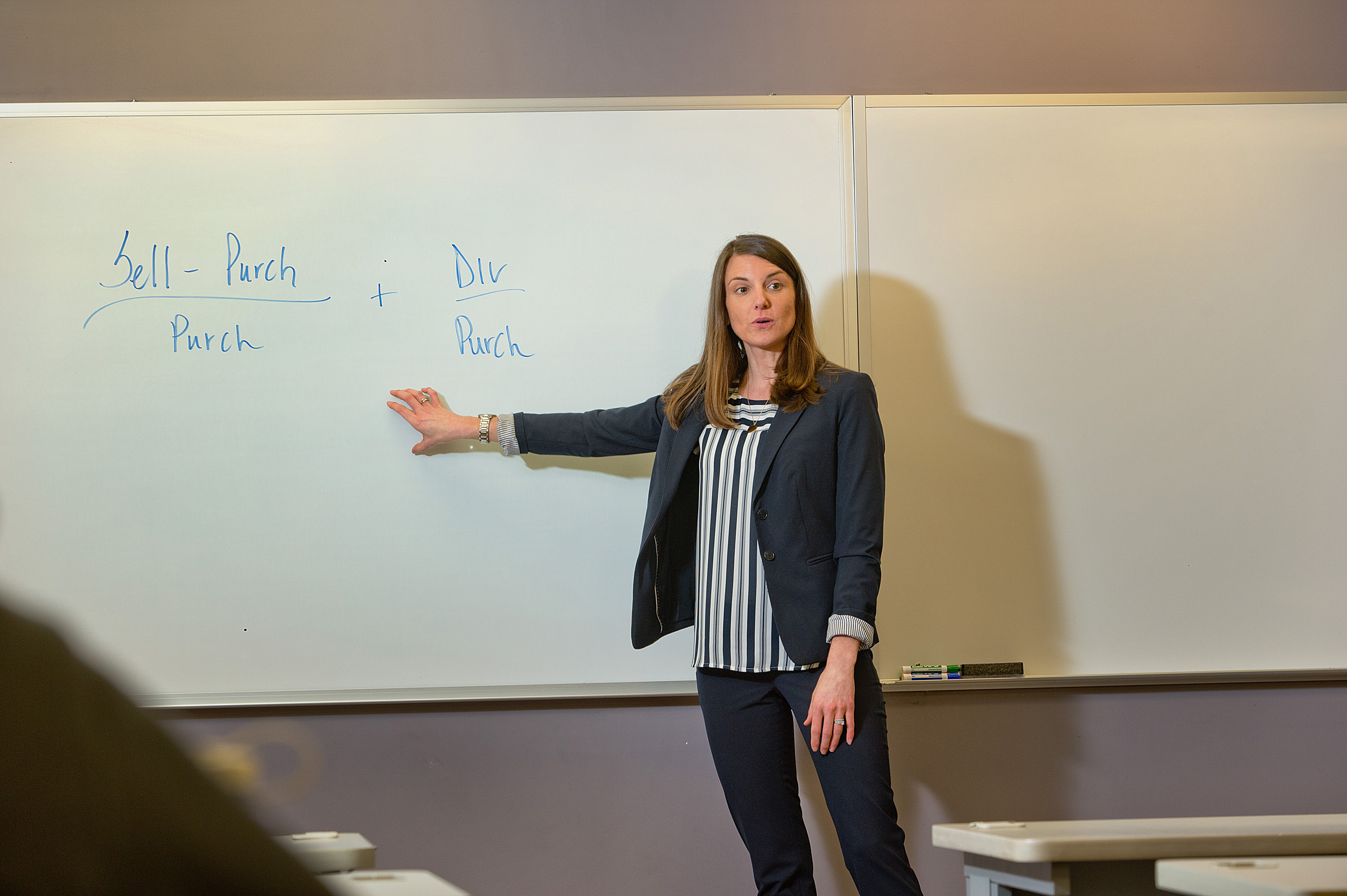Bachelor of Arts in Finance Degree
Invest in your future with the Bachelor of Arts in Finance degree at the University of Mount Union. Our program offers a holistic view of the financial industry, preparing you for success in an array of career fields.
Our expert faculty bring years of industry experience and will ensure you develop essential skills in statistics, business, and micro and macroeconomics. In earning rigorous accreditation from the Accreditation Council of Business Schools and Programs (ACBSP), our finance major combines a dynamic curriculum with today’s market in mind.
View success data for finance and other School of Business programs.
About the Program
The finance major at Mount Union puts classroom knowledge to work through experiences not found at larger institutions. Our student-run Investment Team uses real money to build portfolios and analyze stock market trends, expanding your understanding of the industry during your undergraduate career.
Build a network that will last far beyond graduation through the internships and seminars available to our finance students. You can also collaborate with faculty and peers on research opportunities and projects on topics like foreign exchange and trading.
Finance Quick Facts
- 62-64 credit hours within the finance degree program
- 32 credit hours in the well-rounded Integrative Core
- Invest real money through our Investment Team
- Intern with local or regional firms and companies
- Collaborate with faculty and peers on research and projects
Learn more about the Degree in Finance
Establish yourself as a leader in the economic sector through a Bachelor of Arts in Finance Degree from Mount Union. Combining classroom theory with real experiences, you will be prepared to make a difference in this challenging and rewarding industry.
-
Curriculum
At Mount Union, you will not only take courses in financial practice and theory, but you also will have the opportunity to put your knowledge, talent, and skills to the test by investing real money in stocks through a student-run investment team. Few other finance programs present these opportunities and more by expanding your understanding of the industry and expose you to a wide range of career possibilities. As a finance major, you will also sample a variety of business courses, including micro and macroeconomics, statistics, accounting, marketing and management.
Learning Objectives
- Students will demonstrate critical thinking and problem-solving skills
- Students will demonstrate an awareness of the global environment in which businesses operate
- Students will demonstrate an awareness of their own values
- Students will demonstrate a sense of responsibility and a capacity for service
- Students will demonstrate the ability to recognize when change is needed, adapt to change as it occurs, and lead change
- Students will demonstrate an understanding of their personal interests, abilities, strengths, and weaknesses as they pertain to professional career fields.
- Students will demonstrate a basic understanding of career options available to them and will establish career objectives.
-
Experiential Learning
Students who choose to major in finance at Mount Union have ample opportunities to get “real-world” experience outside of the classroom. By getting involved in extracurricular opportunities and student organizations, you can strengthen your skills and knowledge of finance, both of which are critical to career success. These opportunities, which complement classroom learning, include:
- Internships at for-profit and non-profit organizations
- Seminar at the Chicago Mercantile Exchange
- Independent research
- Research with faculty or student peers
- Research-based courses
Student Organizations
Investment Team is a student-led organization on Mount Union’s campus, in which students manage four different stock portfolios. The opportunity for college students at Mount Union to manage real money is beneficial and practical, as it provides a valuable learning experience. Students not only learn the skills necessary to invest money, but they also learn what it is like to work in a fast-paced business environment.
Delta Mu Delta is an honor society specifically for students with business related majors at ACBSP-accredited schools. Each member must maintain a 3.2 GPA and be within the top 20% of their program.
-
Careers
From corporate finance to financial planning, investment banking to insurance and real estate, the opportunities are bountiful for finance majors. In nearly every field of business, there is a demand for financial knowledge, and as a finance major, you will have the opportunity to work as a consultant or analyst in your own business or for a specific company in any number of positions.
How can our program get you started on a financial career path? Besides exceptional classroom preparation, you’ll have ample opportunity to apply all you have learned. Our investment team, internship program, senior project Chicago Mercantile Exchange seminar and Foreign Exchange trading account project are just a few of the ways you’ll gain invaluable practical experience.
Recent EmployersAXA Advisors
Charter One
On Point Promise
Sherwin-Williams
US Army
Mercer Advisors
Common CareersCredit analyst
Finance officers
Financial advisor
Financial analyst
Financial planner
Loan officer
Investment banker






